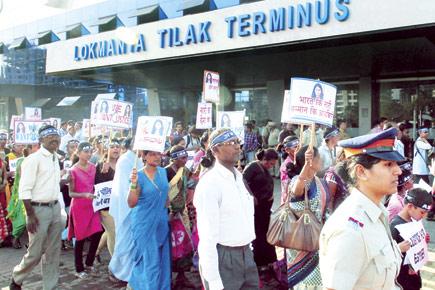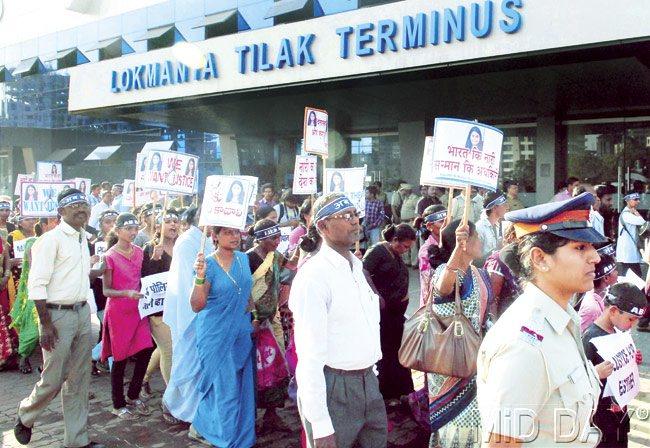Union leaders say unauthorised drivers make the area unsafe and want Transport department to take action; meanwhile, police are interrogating all drivers to identify suspects

The gruesome murder of software engineer Esther Anuhya has highlighted the menace of illegal taxis and auto rickshaws operating outside Lokmanya Tilak Terminus (LTT) railway station at Kurla.
ADVERTISEMENT

People demonstrate and demand justice for Anuhya outside Lokmanya Tilak Terminus on Tuesday. Pic/Sayed Sameer Abedi
Auto rickshaw and taxi union leaders squarely blame this unchecked menace for making the area unsafe. Now, the unions are demanding that the state Transport department, Regional Transport Offices (RTOs) and the Mumbai Traffic police take stern action against these illegal drivers.
Illegal and unsafe
Ever since the police found the decomposed body of Esther Anuhya (23) amid mangroves and shrubs at Bhandup (E) along the Eastern Express Highway (EEH), they have been questioning several auto rickshaw and taxi drivers who frequent LTT. However, the interrogation seems to be going nowhere. Police are at their wits’ end trying to identify suspects in the murder case, and the identity of the driver in whose vehicle Anuhya sat.
The auto and taxi unions believe the culprits may be one of the unauthorised drivers and blame the state Transport department and other agencies for not taking adequate steps against them. “We have told the authorities about these illegal rickshaws plying in and around Kurla LTT.
But, the government is taking no initiative to curb them,” said Shashank Rao, auto rickshaw union leader. They claim that there have been several meetings and letters sent to the relevant authorities before. “We are demanding from the Transport department to start special women-driven rickshaws for the safety of women passengers,” said Thampi Kurien, auto union leader.
Blame game
The Transport department decided to pass the buck on to the police. “We have started a prepaid taxi system at LTT, but within 100 metres of this stand, unwanted elements pester the passengers. I have received several complaints about it, but maintaining law and order is the responsibility of the police,” said VN More, state Transport Commissioner. Transport authorities have informed the RTOs and the traffic police to control the problem, which, they claim, needs heavier policing, as the number of illegal drivers is large.
Scared drivers
The authorised drivers themselves are scared of these illegal vehicles. Presently, the situation is such that touts and drivers in rickety vehicles (minus the uniform and badge) come right inside the railway platforms at LTT, without any fear of the railway police or traffic cops. They fix the rates and most of the times, work as a cartel. Thus, none of them operate the meter. Auto rickshaws and taxis coming from outside are afraid to take on passengers, as the groups outside LTT beat them up.
There is no price list for the prepaid taxis, even though it is mandatory to keep it for the reference of passengers coming from long-distance trains. LTT is infamous as a terminus for its extremely poor connectivity, touts, lack of proper cabs and auto rickshaws and as a place where commuters are often fleeced by drivers.
Safety measures
Unions want the Radio Frequency Identification system to be put into place soon. “The Transport department needs to expedite the process of installing RFID in rickshaws, so that only authorised vehicles can ply,” added Kurien. Radio Frequency Identification (RFID) system is a security device that has all the information about the driver and vehicle, fed into it. Whenever a vehicle goes to an RTO or passes through a tollbooth, its details get registered.
It also becomes easier for the authorities from Transport and Traffic department to verify and crosscheck the details of vehicles, drivers and its owners. The Transport department has decided to issue 34,000 new permits for auto rickshaws, and has mentioned a clause in the application form that drivers must be ready to install the RFID system or GPS system without any protests, once the decision is taken. Since January 27, more than 27,000 applicants have submitted application forms for the permits online and 23,000 have also submitted the Rs 100 processing fee.
 Subscribe today by clicking the link and stay updated with the latest news!" Click here!
Subscribe today by clicking the link and stay updated with the latest news!" Click here!






